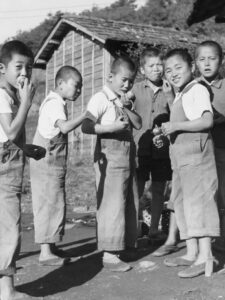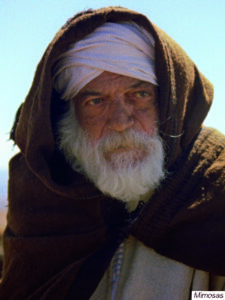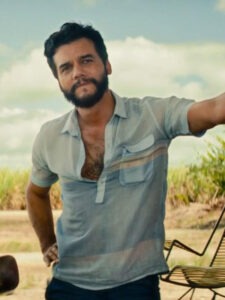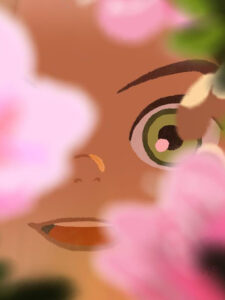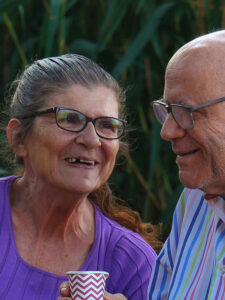
The first screening of the official competition section of the Mostra was by the Tunisian director Nacer Khemir who, with one of the leading actresses of his film Whispering sands, He came to our city to present his work in front of the public and press.. Whispering sandstells the journey of a Canadian tourist of Turkish origin who travels to the desert with a local guide with a mysterious mission. During the journey, both will visit different spaces and people in the region, all seasoned by stories that, as parables, the guide tells the tourist during the trip and that they serve the director to make an inventory of a geography, the desert, and people plunged into poverty today, as well as the relationship between modernity and the wisdom that this traditional world treasures that is decomposing before your eyes..
Para Nacer Khemir, His film offers a reflection “on the loss and disappearance of things. We have towns that have disappeared and along with the towns, stories and lives have disappeared.. When the guide returns to the places of his childhood there is nothing but ruins. There is great destruction in this Arab world. And if it is not a physical destruction, yes it is a destruction of the imaginary, of personality. “I wanted to reflect the pain of that loss because I did not want to talk about violence because violence for us is in our daily lives.”. For Khemir it was about moving away from the forms of dominant cinema and adopting or claiming other ways of telling., typical of their culture and tradition, another voice. “From my first film, I have wanted to work on how to tell stories in a different way from others. It is very important that each culture preserves its way of telling a story because telling a story is not facts., It is an imaginary geography. In fact, In tradition the Arabs were seen as great storytellers, not only for the thousand and one nights. Arabian Nights, somehow, has affected the entire universal imagination. “It’s about preserving this to talk about today’s pain.”
Form and substance are thus intertwined., not only to the nature of a narrative, but of that same human geography that tries to show us. The very way of physically constructing the story during filming will already be conditioned by that need.. “What I do is start filming stories with people who, apart from Noura Saladin and Hichem Rostom [who play the tourist and her guide] They are not actors, They are townspeople. I'm going to a town, I go to the square, I have a topic on my mind and I ask people, do you want to act for me? Do you want to come with me? No preparation. See it, you put on makeup and go ahead. “The whole movie is made like this.”, Khemir himself commented. A way of choosing your “actors” that responds to the need to give voice to those who truly star in the stories you tell us.. “I have enormous confidence in these people., They are capable of everything. But you have to trust them.. Look at them differently. And they are also their own stories. It is a personal satisfaction. It's like a painter who goes with his palette to make sketches and makes sketches of a tree, of a lamb, of a person. And if I ask for something that the actor cannot do, So I ask you for something you can do.. And that's it. For me it is important from a pedagogical point of view to do so, because I want cinema to be shown in schools. The image is the true world revolver today because images tell us how we have to be, how we have to think, how we have to live. And what I tell you is: the image is you. “It’s a game.” A game that aspires to overcome appearances to get to the true heart of the issue that is being resolved here and that, present in the dialogues as a guide for the main actors, support this work. “We belong to another form, which is orality, that is why I have made an oral film, what counts. It is an educational film to tell the relationship between East and West and to demystify the image. I have seen something, since always, and what the dominant culture does is disqualify others and tell them, you are not in the world. Take off those clothes, change clothes to enter the world. And the answer is that there is not just one world, there are worlds. like cosmos. But this must be remembered.”
This confrontation between the West, as dominant culture, and those other worlds that Khemir captures in his work are reflected in a thought, that comes to light when he reflects on the causes and consequences of the imbalances that occur today. “We talk a lot about culture, but the real driving force is not culture, but how to get your hands on the wealth of others. And much of what the Arab world suffers is due to having oil. The project was to place a family friendly to the United States in Saudi Arabia to keep things as they are.. And no Western country is going to reproach them for anything.. We talk about culture, of morality, but there is no morality. It's not anywhere. And solidarity is the last thing of all.” With this horizon, the truth, the reality, what they tell us and that builds our society and the way we see the world is subjected, in the director's words, to a relationship of forces. However, there is hope. “The truth is not the same for a rich person as for a poor person.”. What I try is not to give in, not end up saying: everything is screwed. We have a terrible force in front of us, but we have to continue creating hope. For example, creating hope can be about creating a scene with beautiful colors, not as the market dictates. Dostoyevsky says that beauty will save the world. I don't know if it will save the world, but I hope so. It is complicated because deep down the poor only have their lives to count on.. They don't have anything else. Y, even so, Maybe that's why they are closer to the truth.".
But, where is the solution? one might ask. “The question is not to be Moroccan or Tunisian or Spanish, but to have access to a certain culture. A way of living, to eat, to enjoy life, and not get trapped in the network of a multinational that tells us what we have to do. Truly, the individual now has more possibilities to live and more access to the beauty of the world.. What is missing then?? It is missing, probably, a short time, at the beginning of his life, to learn freedom. That is to say, have a language structure. It can be pictorial, visual or thought. And if you don't have this access to this freedom, is built. And it can only be built in the period of time that childhood lasts.. For me that is the bet if we want to change society.” To Be Born Khemir, contrary to what we might think, this is not very complicated. You have to understand, first, that the world is nothing more than language and for this, the individual has to have access to the emotions that aesthetics produces, the beauty. A discovery that, if it is done when one is young, blocks any alienation. “Because it is not marketable. For example, being in love is not marketable. Or love a color, it is not marketable. And that emotion is the most important part of the human being because that is where man's creativity comes from.. Does not solve the problems, but it gives wings to fly.” G.LEON





